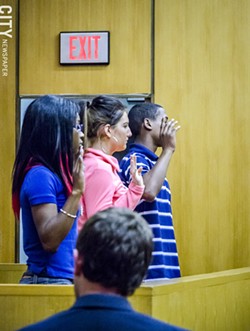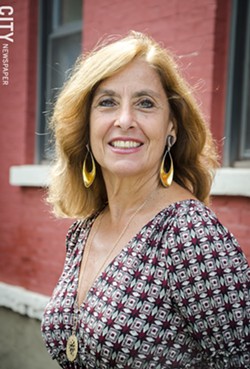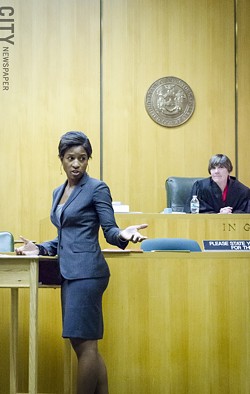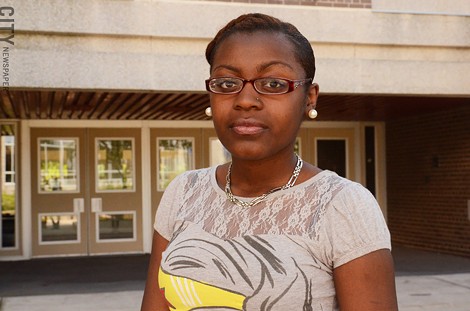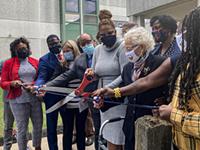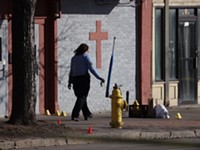
Darryl Ballard went through Teen Court first as a defendant and later as a juror.
[
{
"name": "500x250 Ad",
"insertPoint": "5",
"component": "15667920",
"parentWrapperClass": "",
"requiredCountToDisplay": "1"
}
]
Darryl Ballard says he knows he's lucky that he's not in prison. A short young man with a slight build and dreadlocks pulled back from his boyish face, Ballard says that, two years ago, he cussed out a Rochester police officer while the officer was engaged in an altercation with Ballard's best friend.
Things got out of hand, Ballard says, and he was arrested and charged with disorderly conduct and resisting arrest.
"At first, I couldn't believe it," he says. "I had never been arrested before."
Ballard, who'd recently returned to Rochester, spent the night in jail because, he says, he father couldn't afford bail.
"It was frightening," he says. "I was in there with all these older guys who've done all kinds of stuff. And I didn't know what they were going to do. It was scary. I just stayed up all night."
But it could have been much worse, he says. His scuffle with the officer could have easily turned into a far more serious charge.
"I could have been charged with a felony and I could have done real time," he says.
And that might've been Ballard's fate if not for the Rochester Teen Court, which offers some young offenders an alternative to the traditional criminal justice system. Ballard's misdemeanor charge and his clean record made him eligible for the court, and he got his second chance.
"If it wasn't for Teen Court, I don't know where I'd be right now," he says. "My life wasn't going well."
Ballard is one of more than 1,000 area teens who have participated in the court since it began 15 years ago. Ballard says that the court helped him get counseling to control his anger.
Though he's good in math and technology, Ballard says that he wants to go to Monroe Community College to pursue music and art. He says that prior to his experience with Teen Court, going to college wasn't a priority.
Even though the Teen Court is highly regarded by local educators, law enforcement, social workers, and attorneys who work with youth and their families, it came close to being shut down this year due mainly to funding cuts.
If Teen Court shut down, the impact would be felt most by teens like Ballard, who are among the area's most vulnerable and at risk. The cost to taxpayers could climb, and an opportunity for many young people to become productive citizens would be lost.
The Rochester Teen Court was created under former mayor William Johnson.
A small contingency of professionals involved with young people and Family Court traveled to Galveston, Texas to learn about that city's teen court. The group was led by Van White, who was special counsel on crime initiatives in the Johnson administration and now sits on the Rochester school board, and US District Court Judge Frank Geraci.
"Our response to crime was comprehensive," White says. "It was a three-pronged approach: prevention, intervention, and interdiction. The teen court Rochester modeled after Galveston's was about both prevention and intervention."
The concept of youth justice dates back to the late 1800's, and the special courts are sometimes called "youth" or "peer" courts. Prior to the 19th century, children over the age of 5 were considered mature or miniature adults, writes DeMica Robinson, in a study for Wilson County, Tennessee concerning the effectiveness of teen courts. Back then, children who got into trouble were usually placed in work situations under apprenticeships or subjected to church discipline methods, where they often received public whippings and floggings.
There are about 4,000 teen courts operating in cities throughout the US, and there are several different versions. The Rochester Teen Court is a voluntary option for youth ages 16 to 19 who have committed low-level, non-violent, first-time offenses. It doesn't cost them anything, but the offer comes with some rules.
First, the court is a sentencing court. When a City Court judge offers a teen defendant the option of going through Teen Court, it's with the clear understanding that the teen acknowledges guilt. The case is heard by the presiding judge, and the defendant's attorney and a prosecutor are present for some training and technical guidance.
But the defendants are represented by peer attorneys, and it's the job of peer prosecutors to seek the sentence they think is appropriate from a jury composed of the defendant's peers. Some of the jurors and all of the peer attorneys are volunteers, often motivated by their interests in criminal justice or law.
In exchange for completing the terms of the sentence, the defendant's record is sealed. Sentencing might include community service, a presentation or written essay about the crime and its impact on others, and an apology to those who were hurt.
Defendants may also be required to receive counseling for drug or alcohol dependency or anger management, and they have to agree to serve as teen jurors in at least three cases.
Most teens who qualify for Teen Court do choose that option, says City Council member Elaine Spaull. Spaull is also director of the Center for Youth, where much of the Teen Court program is administered.
"The goal here is to make this first offense the last one," she says. "This is serious. This isn't a game we're playing here. If you don't complete the sentence, you'll go right back to the regular court. And that's not going to be good. You're not going to like what happens there."
When the program hit a financial hurdle this year due to severe budget cuts by the Rochester school district — one of its biggest funders — Spaull scrambled to fill the gap.
"Ask anyone who knows about youth and criminal justice in this city and they'll tell you this program works," she says.
The Rochester Police Department gave Spaull informal data showing that teenagers who go through the court have an approximate 15 percent recidivism rate. The data isn't perfect because the RPD is unable to track teenagers who leave the area, Spaull says. But she says that's a small number.
That falls in line with recent studies on youth courts. A report funded by the Office of Juvenile Justice and Delinquency Prevention and the Urban Institute followed 500 young people in four states who went through youth courts. A year later, the recidivism rate was in the single digits.
That's dramatically lower than it is for teenagers who go through the regular system, Spaull says. Recidivism for that group in most cities is roughly 39 percent, she says.
The vast majority of the youth who go through Rochester's Teen Court are city school students. But the court is seeing more students from the suburbs, Spaull says. And the students are a mix of males and females, she says.
The crimes are what you might expect from the average teenager, says Justice Frank Geraci, a big supporter of the Teen Court. Shoplifting, trespassing, stealing, drug possession, and minor fights and altercations make up the majority, he says.
Sometimes called "gateway crimes," they're often symptoms of bigger problems in a young person's life, Geraci says.
"If we could deal with the underlying problems, we could reduce crimes overall," he says.
The judge or teen attorney may ask questions like, "What is your home life like? What is your GPA? How many days of school have you missed so far this year? Do you use marijuana? When was the last time you used it?"
The idea is to slow the justice system down, Geraci says. Judges normally don't have the opportunity to learn all of the extenuating circumstances that might be influencing a young defendant's life, he says.
As an example, Geraci cites a case that, he says is never far from his mind.
"One young woman wasn't going to school, and when she was, she would get into these fights," he says. "But we found out that she was taking care of her two young siblings and dealing with a drug-addicted mother. We were able to identify the problem she was having — a lot for a young person her age to be dealing with. But we were able to hook her up to the resources to not only help her, but begin to address the problems her mother was having."
Studies show that the other reason youth courts work has to do with the teenage peers. Contrary to the impression that many people have — that youth courts are a slap on the wrist or "kiddie" courts — teenagers can be especially tough on their peers.
And they understand, perhaps better than almost anyone else, what may be happening to the teenager sitting across from them, says city school board president Malik Evans.
Evans was one of the first students to volunteer as a teen attorney. He says that there's often a dynamic that happens between teens. They know when they're being conned, he says, and they're not afraid to call the person on it.
But they also know what questions to ask and where to look for problems, Evans says. They're able to communicate with one another in ways that adults, including parents and family members, sometimes find too difficult, he says.
And Teen Court offers an incredible educational opportunity for students, Evans says.
"You learn how to speak in front of others and present your ideas to make your point," he says. "And you learn about the judicial system."
Kashii VanHook just finished volunteering as a teen attorney. The 17-year-old senior at Greece Athena High School says that she is giving serious thought to going into law, and Teen Court gave her the opportunity to see how the criminal justice system works.
"It's a learning experience for everyone involved," VanHook says. "I could see that it really helped them [teen defendants] to open their minds and turn themselves around. It helped me because I am interested in psychology, social work, and the law. And I learned that sometimes people deserve a second chance. I really don't think most of them will make the same mistake again."
Sometimes it takes an event like this for some young people to know that people care about them, she says.
"When they're there in the courtroom, they're frightened because they don't want to go to jail," she says. "Nobody wants that. But sometimes it takes something like this for them to realize that people are trying to help them."
VanHook remembers one young girl who was caught shoplifting.
"Her mother was there in court with her," she says. "The mom really loved her child and was trying everything she could to help her. In fact, I never found one situation where the mom wasn't there fighting for her child. When you see that, that's powerful."
It's ironic that youth courts like Rochester Teen Court fall prey to budget cuts because most research shows that they are one of the most cost-effective tools available in the criminal justice system, says former mayor William Johnson. This year's budget for Rochester Teen Court is about $100,000. The adult attorneys and judges involved with the court often donate their time.
"This is a special court that doesn't need a lot of money," Johnson says. "Think about it. Incarcerating one teen for a year can cost up to $150,000. And all we're trying to do is keep minor offenses from turning into major problems."
"Almost every college campus today has something comparable when issues come up, like cheating or plagiarism," he says. "They try to find a solution before this disrupts your whole college education and career. What good would that do any of us? And I look at Teen Court in a similar way."
But keeping young people out of the criminal justice system even for minor incidents is harder than you might think. Society's attitude toward juvenile crime has changed over the last 30 years.
Not long ago, if a young person got into minor trouble, he might have to work a couple of weekends to pay for the neighbor's broken window, for example. That's not the case today, particularly in urban environments where people often don't know their neighbors well. Even a minor schoolyard fight can have unintended consequences.
A 16-year-old can be tried as an adult in North Carolina and New York. Advocates of the "Raise the Age" program want the age limit raised to at least 18 because, they say, teens often can't control their impulses and they make poor decisions as a result.
And once they enter into the criminal justice system, even for minor offenses, they are passengers in what many sociologists and judicial experts call the "cradle to prison pipeline."
Each year, New York's criminal courts see 16 and 17 year olds — as many as 50,000 — who face the possibility of prosecution as adults. And more than 74 percent of the time, according to the Children's Defense Fund, it's for misdemeanors. Most of these young people are black and Latino.
"What changed about a dozen or so years ago was we adopted programs with zero tolerance," says Judith Kaye, former chief judge of the New York Court of Appeals.
Most often these teenagers are from poor households, she says. They need guidance, Kaye says, and for a variety of reasons, they aren't getting it. These are the same young people who get stopped and frisked, she says, and they're also the ones most likely to drop out of school.
Even a minor brush with the law can be a critical junction in the life of a young person, Kaye says. While there must be consequences for minor crimes, she says, the goal needs to be intervention that prevents escalation.
"If we drop them, we're putting them on a path to prison," she says. "And our prisons are already filled."
Speaking of...
Latest in News
More by Tim Louis Macaluso
-

RCSD financial crisis builds
Sep 23, 2019 -

RCSD facing spending concerns
Sep 20, 2019 -

Education forum tomorrow night for downtown residents
Sep 17, 2019 - More »
